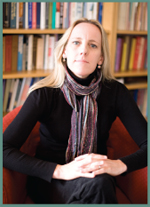I’ll Continue to Affirm that This Was a Failure of the Editor.

On May 7 a white woman at Yale called campus police on fellow graduate student Lolade Siyonbola, a black woman who had fallen asleep in the common room of the residence hall in which they both live. Siyonbola videotaped her encounter with police who responded and also reported that the white woman—Sarah Braasch—had called them back in February when another black student, a male, was in the building to meet Siyonbola but was having trouble remembering which room she lived in. Braasch’s actions were widely reported as another example of the indignity and threats black Americans face on a daily basis.
I published two articles by Sarah Braasch in the Humanist—one in 2009 and another in 2010. They contain racially offensive argumentation, and while not the crux of either piece, they surfaced when the Yale story hit. I was the editor back then as I am now, and have had to face what constitutes a serious lapse in judgment on my part. The articles were removed online and replaced with a statement of acknowledgment and apology.
“Original Intent” (2009) was a commentary on the Puritanical dogma and religious tyranny in colonial America, making the case that our nation was founded on principles antithetical to such oppression. However, Braasch’s interjection that “once you go back a handful of generations you realize that social constructs like racism and tribalism seem downright silly” renders this article out of step with a commitment to social justice and to the reality that racism permeates our culture today. The second article, “Lift the Veil, See the Light” (2010) was what got the most attention last month. It was part of a point-counterpoint on a proposed law being debated at the time that would bar Muslim women in France from wearing face-covering veils. Arguing for the ban, Braasch recalled being assigned the pro side of the American slavery debate in junior high and arguing successfully that the decision a small number of slaves made to stay with their owners after emancipation was one you couldn’t take away. She then made an analogy to women who choose to be “slaves” in abusive, misogynistic, or otherwise patriarchal religious traditions.
There’s no way we can fully monitor and censor the opinions or actions of people who write for us. We can only control what we publish, and so I’ll continue to affirm that this was a failure of the editor. If I could go back in time, I would temper the author’s gleeful tone at hitting upon the winning strategy for her middle school debate about the merits of slavery. I would question the practice of assigning such a debate in the first place and also why that strategy even worked; why should the fact that some slaves stayed with their owners prove that the practice had merit? Seems to me the other side didn’t argue very well.
The author wanted to show that the freedom to choose how one lives one’s life can be wrapped up in conditioning and oppression, and then argue that this makes it a false choice that society should oppose; wearing the burqa is not truly living free just as remaining with one’s former owner isn’t. In a sense she was arguing against her middle school self. However, the analogy should’ve been scrapped altogether, as some have said that reading about the debate that was assigned and the outcome, along with the author’s tone and her actions of late, is a triggering experience. Had the piece been carefully edited, would the trigger still exist? I think it probably would, and I think many would say it’s wrong to compare anyone’s experience of being oppressed to the experience of slaves in this country.
I reject the idea that this being published eight years ago lets me off the hook. The optics on this—the way the offending passages were presented to corroborate Sarah Braasch’s actions at Yale—are clear and can’t be rationalized.
Before all this happened, I had been communicating with Sikivu Hutchinson for a feature in the magazine profiling a number of black women nonbelievers. Hutchinson has for some time criticized the Humanist for not featuring a woman of color on the cover, and I had decided to make “Five Fierce Humanists” the cover story for the July/August issue. After the Yale story broke I informed Hutchinson about steps we were taking and to assess how she and the others felt about going forward with the story. She responded that they were interested in proceeding if she could include a critical commentary. I’m especially grateful to these five women, and to many other people (including Charles Murn and Greg Epstein writing herein) who’ve openly discussed our publication of the articles and the wider issues of white privilege in the humanist/secular movement. I’ve always seen “going there” as one of the primary functions of the magazine—not to further divide but to air, discuss, even try to disinfect, and to continue the work of refining a true humanism.
